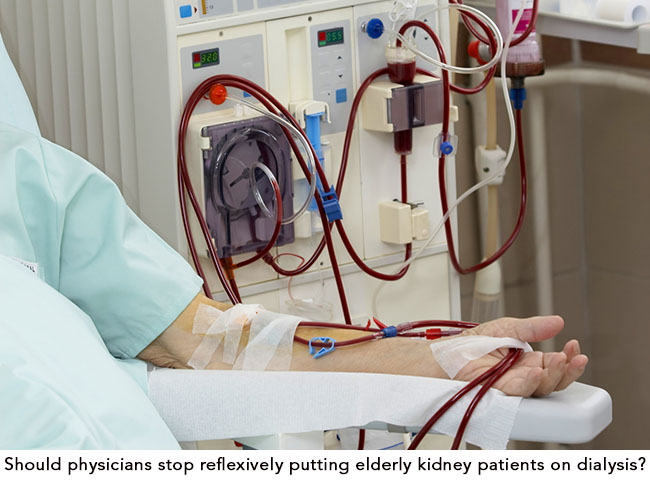How Do You Know When to Stop Dialysis
The nurse practitioner exhaled completely equally she plopped down next to me in the clinic workroom — as if she had used up her last flake of energy. She had spent the terminal hour with a 75-year-one-time man with severe chronic kidney disease. His kidneys were filtering about 4 teaspoons of his blood every infinitesimal when normal is 25 teaspoons.
I was the supervising nephrologist, so I asked her how things were going with the patient. She told me his basic medical history and and so said, "Then I merely told him, 'If you lot don't start dialysis, y'all're going to dice.'" She tilted her caput and nodded in that way we clinicians practice when we think we've summoned the courage to say what needed to be said. She went on to an exasperated, "Why does he keep coming back here if he doesn't want dialysis?"
Because she was new to nephrology and the care of patients approaching cease-stage kidney affliction, I shook my caput in thwarting, thinking, "They got to her first."
They were the same ones who taught me.

They tell patients, "Start dialysis, or you'll be expressionless in two weeks" or "You take a responsibleness to your grandchildren to be hither." They even say, "But effort it, and if yous don't similar information technology you can stop," without offering a vision for what they hope dialysis tin can do and past when. They say it over and over over again every time the patient comes to the dispensary until he agrees — or stops coming back.
More Time, but at What Toll?
They never say, "Are you lot sure you want to start dialysis?" because they believe dialysis is always the appropriate response to kidney failure. Because they believe dialysis always prolongs life, and prolonging life is all that matters.
Experience has given me dissimilar lessons.
Dialysis may not be the best option for everyone with kidney failure. Several European studies have shown that dialysis does not guarantee a survival benefit for people over age 75 who have medical problems like dementia or ischemic heart disease in improver to stop-stage kidney disease. In fact, it frequently worsens their quality of life. 1 written report found that elderly people who had dialysis lived on average a twelvemonth longer than those who didn't — just almost all of this added time was spent in the hospital, traveling to and from dialysis, or undergoing dialysis treatments.
People with just a little bit of kidney function usually alive much longer than two weeks — often months, sometimes years. People similar Mrs. N, an 88-year-onetime woman whose kidneys filtered only one teaspoon of blood each infinitesimal when I met her. Many of my colleagues would take started her on dialysis, contributing to the fact that patients over 75 are the fastest-growing grouping starting dialysis, doubling over the concluding two decades. Mrs. N would have felt very tired after her dialysis treatments. She probably would have experienced lightheadedness or cramping during the treatments. And she likely would take needed procedures and even hospitalizations to proceed doing them.
Instead, she died two years later — at domicile, pain-free, and surrounded by family. And without the rigors of dialysis.
Creating a Dialysis Alternative
It is for patients like Mrs. N that I have been working to create a bourgeois management programme every bit office of the nephrology clinic at Zuckerberg San Francisco General Hospital. Information technology would exist an alternative to dialysis, managing patients' symptoms of progressive kidney failure with the goal of maximizing the quality of their remaining fourth dimension without dialysis — when the risks of dialysis outweigh its benefits, as information technology frequently does for frail, elderly patients over 75. On average, this group survives less than half-dozen months after starting dialysis. One written report of U.s.a. nursing home patients found that 60% had either died or had decreased functional status (the ability to do things like walk, bathe, go dressed, exit of bed, and employ the toilet) just iii months afterwards starting dialysis.
Such a program is sorely needed. Outpatient palliative intendance is nearly nonexistent, and hospice providers haven't figured out how to meet the needs of patients with kidney failure. For instance, when hospice arrived for a showtime visit at Mrs. North's home, the offset matter they asked about were funeral arrangements, which is what they tend to do for cancer patients, when all Mrs. North was feeling was a little nausea and fatigue. She was non unusual — patients with end-stage kidney disease tend to accept few symptoms until decease is imminent. Further, while anemia direction is central to the care of our patients with advanced and cease-stage kidney disease, medicines like Darbepoetin that care for anemia are not on hospice formularies because they are considered life-prolonging. Not but did this arroyo prompt Mrs. N'south daughter to quickly prove hospice folks the door and shut them out forever, it also caused her to haul the wheelchair-bound Mrs. N to dispensary twice a month to get the shot that could have hands been given at home.
I know the cards are stacked against me beyond the walls of the clinic, but the nurse practitioner'southward words let me know that the odds are against me inside the dispensary walls too. A conservative management plan is not possible if wellness care providers don't believe it is the appropriate selection, if nosotros continue to attempt to convince and coerce — even peachy and scare — people into believing that dialysis is the answer to kidney failure and that information technology can always prevent them from dying.
Many hearts and minds demand to change. I started with the nurse practitioner.
Source: https://www.chcf.org/blog/when-dialysis-is-the-wrong-approach-to-end-stage-kidney-disease/

0 Response to "How Do You Know When to Stop Dialysis"
Post a Comment